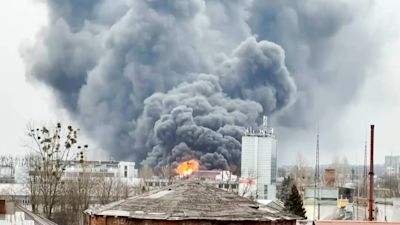Powerful explosions heard outside western city of Lviv

'The force of the explosions felt like an earthquake': Lviv residents witness attack on their city, ITV News Correspondent Geraint Vincent reports
Powerful explosions have rocked an area near the western city of Lviv, a regional governor has said.
Air raid sirens sounded and plumes of smoke could be seen rising into the sky on Saturday in an area close to the TV tower.
The governor, Maxym Kozytsky, said that five people had been wounded.
The city of more than 700,000 roughly 45 miles east of Ukraine’s border with Poland has been largely spared from major attacks in recent weeks.
ITV News Correspondent Geraint Vincent and producer Lutfi Abu Aun witnessed thick black smoke rising from the northeast side of the city.
Two weeks ago, the Russian forces fired missiles on a military training centre near Lviv, which at the time was the most westward target, and killed 35 people.
The city has become kind of a safe harbour for many Ukrainians fleeing their ravaged cities and towns, with an estimated 200,000 of them thought to be sheltering there.
Elsewhere in Ukraine, other cities continue to be targeted by Russian attacks, including Chernihiv which, like the pulverised southern city of Mariupol, has been blockaded and pounded afar by Russian troops.
“In basements at night, everyone is talking about one thing: Chernihiv becoming (the) next Mariupol,” said 38-year-old resident Ihar Kazmerchak, a linguistics scholar.
The city is also without power, running water and heating and at pharmacies the lists of medicines no longer available grow longer by the day.
"Food is running out, and shelling and bombing doesn't stop," Kazmerchak said - he starts his day in a long line for drinking water which is rationed to 10 litres per person. People come with empty bottles and buckets for filling when water-delivery trucks make their rounds.
Chernihiv straddles one of the main roads that Russian troops invading from Belarus used on day one of the invasion - for what the Kremlin hoped would be a lightning strike onward to the capital Kyiv which is just 91 miles away.
The mayor, Vladyslav Atroshenko, estimates Chernihiv's death toll from the war to be in the hundreds.
Russian forces have bombed residential areas from low altitude in “absolutely clear weather" and "are deliberately destroying civilian infrastructure - schools, kindergartens, churches, residential buildings and even the local football stadium,” Atroshenko told Ukrainian television.
So intense is the siege that some of those trapped cannot even muster the strength to be afraid anymore, Kazmerchak said.
“Ravaged houses, fires, corpses in the street, huge aircraft bombs that didn’t explode in courtyards are not surprising anyone anymore,” he said. “People are simply tired of being scared and don’t even always go down to the basements.”
In other evidence of the continued offensive, Russian troops have seized control of the town of Slavutych, where workers at the Chernobyl plant live, according to the governor of Kyiv region, Oleksandr Pavlyuk.
But with the invasion now in its second month, Russian forces have seemingly stalled on many fronts and are even losing previously taken ground to Ukrainian counter-attacks, including around Kyiv.
The Russians have bombed the capital from the air but have not taken or surrounded the capital and on Friday evening the Pentagon said that Russia is no longer in control of Kherson - the one city they had claimed to capture.
However Russia continues to strike encircle urban populations, from Chernihiv and Kharkiv in the north to Mariupol in the south, and Ukrainian authorities said on Saturday they cannot trust statements from the Russian military that it is scaling back its invasion aims and concentrating on taking control of Ukraine's eastern Donbas region.
The region has been partially controlled by Russia-backed separatists since 2014.
Britain’s defence ministry said Saturday that it does not expect a reprieve for citizens of Ukraine's bombarded cities any time soon.
“Russia will continue to use its heavy firepower on urban areas as it looks to limit its own already considerable losses, at the cost of further civilian casualties.” the UK ministry said.
Previous bombings of hospitals and other non-military sites, including a theatre in Mariupol where Ukrainian authorities said a Russian airstrike is believed to have killed some 300 people last week, already have given rise to war crime allegations.
Video shows the parts of the three-storey Mariupol theatre were completely destroyed
Ukrainian President Volodymyr Zelenskyy, appearing by video-link at Qatar's Doha Forum, on Saturday and he compared the destruction of Mariupol to the Syrian and Russian destruction wrought on the city of Aleppo.
He warned that people beyond Ukraine may find themselves short of food if the invasion isn't stopped.
“Russian troops mine fields in Ukraine, blow up agricultural machinery, destroy fuel reserves needed for sowing. They blocked our seaports. Why are they doing this?” Mr Zelenskyy asked.
“Our state will have enough food. But the lack of exports from Ukraine will hit many nations in the Islamic world, Latin America and other parts of the world.”
And in a video address late on Friday, Mr Zelenskyy said that Ukrainian forces have dealt "powerful blows" to Russian forces, adding that Russia has not been able to take the capital Kyiv or Kharkiv, the second-largest city.
Mr Zelenskyy urged for meaningful diplomatic talks as weeks of on-and-off peace negotiations have failed to make any significant progress.
"Our defenders are leading the Russian leadership to a simple and logical idea: we must talk, talk meaningfully, urgently and fairly," he said.
So far, the invasion has driven more than 10 million people from their homes, almost a quarter of Ukraine’s population.
Of those, more than 3.7 million have fled the country entirely, according to the United Nations and thousands of civilians are believed to have died.